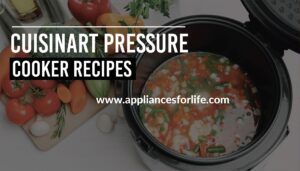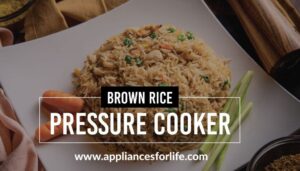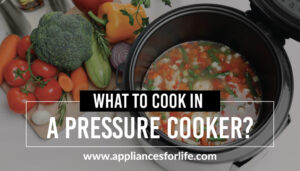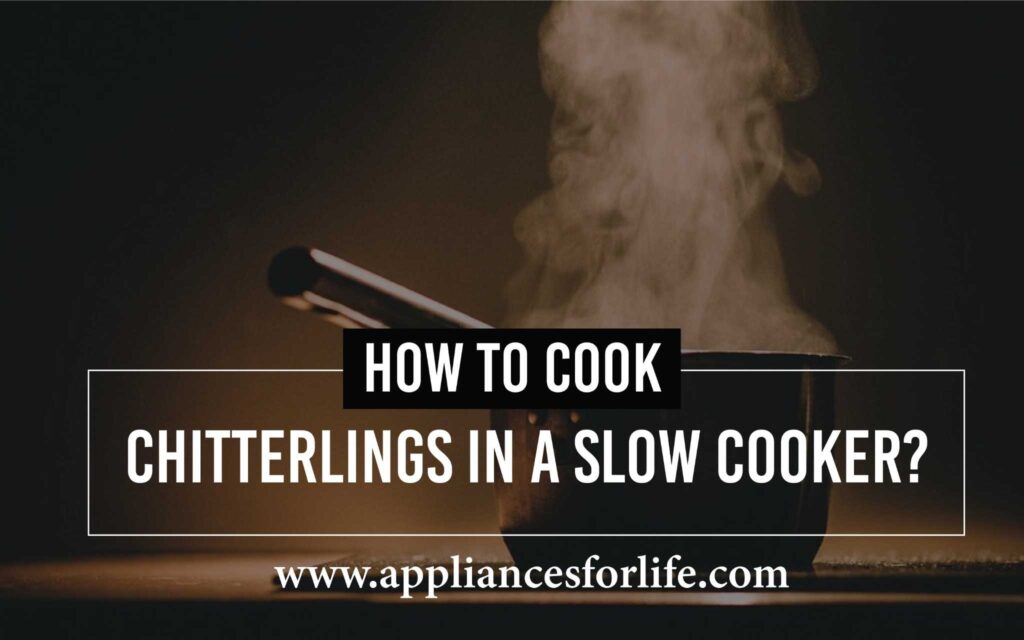How To Cook Chitterlings In a Slow Cooker
Have you ever had chitterlings? If not, you’re missing out on a delicious – and surprisingly easy-to-make – dish. Chitterlings are a type of food made from the small intestines of pigs. And while that might not sound appetizing, they’re actually quite tasty – especially when slow cooked in a pressure cooker. This post will show you how to cook chitterlings in a slow cooker. We’ll also share some tips on cleaning and preparing chitterlings for cooking. So if you’re ready to try something new, read on!
Table of Contents
ToggleThe kitchen would be incomplete without the appliances filled with it. While some of the appliances are big names, like refrigerators, microwave ovens, and cooking ranges, small appliances like blenders and slow cookers also help to keep things together in the kitchen. The appliances come in all shapes, sizes, colors, and brands, so it can be hard to decide which one to buy. Each has unique features and benefits, so you must consider what you’ll use the appliance for before making a purchase. Some appliances are used more often than others, but they all play a role in the kitchen.
A good refrigerator should be able to store food long-term, keep it at the right temperature, and give you information about what’s inside. An oven should be able to bake a variety of foods, and a microwave should be able to heat food quickly. A slow cooker is a great tool for making dinner at a later time, and blenders can be used for a variety of tasks in the kitchen.
Blenders help make smoothies and other drinks, while slow cookers can do many different things like slow cook beef or pork, make stews, or make a pot of chili. Different appliances are perfect for different tasks, so you must choose the one that will work best for your needs.
The oven is used for cooking food and baking goods, the microwave for heating food, and the refrigerator for storing food. Each appliance has its benefits, so you must consider what you’ll use it for before making a purchase. When you’re choosing an appliance, be sure to consider your needs and what the appliance can do.
Microwaves are a common fixture in most kitchens, as they can be used to cook food quickly and evenly. Ovens are also used a lot, as they can be used to bake bread and pastries or to cook meals. Slow cookers are perfect for those who don’t have much time to spend in the kitchen, as they can cook a meal without fuss.
Pressure cookers are enjoying an increase in popularity, thanks to their growing importance in the kitchen. These cookers are so fast that they can prepare your food in minutes rather than hours. They are perfect for people on the go or those who don’t have much time in their day. Pressure cookers have become so popular that they are now in nearly every kitchen. They can be used for various dishes and are perfect for people who want something quick and easy.
This is a big advantage if you have a lot of people to feed or you want to save time on a busy day. They are also very versatile and can do various tasks, such as making soups, stews, and rice. They are also a healthy way to cook your food because they use less energy and are safer than other types of cookers.
Pressure cookers can also be used to make healthy food. There are a variety of pressure cookers on the market, and you can find one perfect for your needs. Some are designed for people with a lot of time to cook, while others are more suited for people on the go. They all have different features, and you can find one perfect for your needs.
Pressure cookers have even become popular among pregnant people because they are a healthy way to cook their food. They are also a healthy way to cook your food because they use less energy and are safer than other types of cookers. They are also a healthy way to cook your food because they use less energy and are safer than other types of cookers.
Pressure cookers are not only fast, but they also ensure that your food is cooked evenly. This is one of the reasons they are so popular. They also tend to be more affordable than other types of cookers, making them a great choice for those on a budget.
They are perfect for people who want to reduce their environmental impact. Pressure cookers use less energy than other cookers and are also a healthier way to cook your food. They use less energy and are safer, so they are perfect for people who want to reduce their environmental impact.
What Are The Benefits of Slow-cooking Chitterlings?
There are several key benefits to slow cooking chitterlings. First, slow cooking tenderizes the meat and makes it easier to chew. Second, slow cooking helps eliminate some strong flavors that can be off-putting to some people. And finally, slow cooking retains more nutrients in the chitterlings than other cooking methods.
While slow cooking results in some nutrients due to evaporation, this is still a better method than frying or boiling, as these cooking methods result in a loss of around 90% of the nutrients in the chitterlings. So while slow cooking still results in a loss of nutrients, it is not nearly as much as other cooking methods.
And once cooked, you can preserve some of these lost nutrients by storing the chitterlings in an airtight container with a bit of vinegar. This will help to lock in moisture and prevent the chitterlings from drying out. When stored properly, cooked chitterlings can last for up to a week in the fridge. So if you want to enjoy all the benefits of slow cooking, be sure to try it the next time you’re in the kitchen.
Nutritional Value of Chitterlings
Zinc
Chitterlings are a high source of zinc, a mineral the body needs and uses to heal wounds, metabolize carbohydrates, and grow cells. A serving of chitterlings contains about 1.6 mg of zinc, which is a little of the 8 to 11 mg of the daily recommended zinc intake.
Although it is a little, it is still a good amount because the body only absorbs about 40 percent of the consumed zinc. Chitterlings also contain other essential nutrients for the body to function properly. The body needs these nutrients to heal wounds, metabolize carbohydrates, and grow cells.
Zinc is necessary for wound healing, carbohydrate metabolism, and cell growth. It can also be used as a supplement to treat colds. Zinc is not produced in the body, so it is important to get enough in the diet. Good sources of zinc are found in meat, poultry, and seafood.
Protein
Protein is another thing you can find in chitterlings. A 3-ounce serving of chitterlings has about 10.6 grams of protein, which is required for immune functions and muscle growth. You also need protein to produce enzymes and hormones. According to the Harvard School of Public Health, the average man should consume about 56 grams of protein daily, and the average woman should consume about 46 grams daily.
Protein is essential in repairing body tissues and is a transportation system for important vitamins and minerals throughout the body. A protein-rich diet helps people feel fuller longer, which may lead to weight loss.
This amount of protein is about 21 percent of the daily recommended intake for protein, according to the Centers for Disease Control and Prevention. Chitterlings are also a good source of phosphorus and zinc. Phosphorus works with calcium to build strong bones and teeth, while zinc is necessary for wound healing and a healthy immune system.
Vitamin B-12
If you need a good source of vitamin B-12, chitterlings are a great choice. You can get 0.4 mcg of vitamin B-12 from a 3-ounce serving of chitterlings. While it may not be the sufficient amount the body needs daily, it will still have some positive effects on the body. Vitamin B-12 can help with energy levels, mood, and memory. It is recommended that adults should have at least 2.4 mcg of vitamin B-12 each day.
Vitamin B-12 helps the body make red blood cells, which carry oxygen. It is also needed to properly function and develop the brain, nerves, and blood. A lack of vitamin B-12 can lead to anemia, a decrease in the number of red blood cells in the body, or a condition called macrocytic anemia, which affects the size and function of red blood cells. Chitterlings are known to boost mood and energy levels because of the vitamin B-12. Chitterlings should be your go-to meal if you want a meal that will boost energy.
What’s the Best Slow Cooker For Chitterlings?
You’ll want to keep a few things in mind regarding slow cookers. First, when choosing a slow cooker, you’ll want to choose one that is large enough to fit all the chitterlings. If your slow cooker is too small, your chitterlings can become overcooked before the liquid is reduced. This will make your chitterlings soft and mushy in texture rather than tender and meaty.
Second, ensure the slow cooker has a tight-fitting lid to prevent any liquid from escaping as it cooks. Third, opt for a slow cooker with a timer so you can set it and forget it. Your chitterlings will cook best if they are left alone! You do not want to lift the lid and disrupt their cooking process by checking on them periodically. Just set the timer and let them cook.
Once done, remove the slow cooker from the stovetop (to avoid an electrical shock) before lifting the lid to test and ensure that your chitterlings smell cooked and savory. Chitterlings cooked with these methods will be tender, juicy, savory, and delicious! And if you happen to buy store-bought chitterlings, just be sure to cook them in ample liquid, with the lid on tightly, at medium temperature for at least six hours before adding seasonings. That way, you can be sure that your chitterlings will be tender and delicious! Looking for the best pressure cooker brands to consider? Check out our article on the best pressure cooker brands in 2022.
How Do You Prepare Chitterlings For Slow Cooking?
The first step, cooking fresh or cured chitterlings, is to clean them. You will want to rinse the chitterlings several times in warm water until all the dirt and debris have been removed from the crevices of the intestine. Next, cut off any fat or connective tissue and discard it. Once the chitterlings are prepped, they’re ready to be cooked! You can either boil them or fry them, depending on your preference.
We recommend boiling them first, then frying them afterward. Boiling will tenderize the chitterlings and make them easier to fry. Once boiled, allow the chitterlings to cool before frying them.
A vinegar-based sauce typically accompanies fried chitterlings — aka dip — so we recommend making this while the chitterlings are boiling. The dip is simple: Heat some vinegar with hot sauce (we recommend Frank’s) and garlic powder until it thickens slightly. Some people like adding mustard flour or spices to their dip, but we prefer it simple. When you serve fried chitterlings, don’t forget the mustard! A bit of yellow mustard on top adds some tangy flavor that complements the chitterling well.
How To Cook Chitterlings in a Slow Cooker
Now that your chitterlings are cleaned and prepped, it’s time to cook them. Simply add the chitterlings to your slow cooker and any seasonings or liquids you desire. Since chitterlings can be tough, some people like to parboil them first by boiling them in water before adding them to the slow cooker. But, if you really want to do it, then go for it.
Just know it will take longer for the chitterlings to cook that way. Then, simply set the timer and let the slow cooker do its job. Depending on your slow cooker, it may take four to eight hours for the chitterlings to be fully cooked. Once your slow cooker is done, remove the pot’s chitterlings and set them aside.
Next, drain any fat from the pot (do not discard) and add about half a gallon of water and any seasonings you may desire to make your sauce. For this recipe. Once your water is added, turn your slow cooker on low and cook until all of the liquid has been absorbed into the chitterlings and reached their desired consistency.
Now, return the chitterlings to the slow cooker and stir in chopped onion, chopped jalapenos, and chopped cilantro until evenly distributed throughout. Add your black beans and continue cooking on low heat until all of the beans are warm in temperature while stirring occasionally.
And there you have it! Slow-cooked, deliciously seasoned southern-style chitterlings with black beans served in a flour tortilla for a quick lunch or a hearty dinner! Once they’re done, remove the chitterlings from the slow cooker and enjoy! Chitterlings are typically served with rice and beans or potatoes. They can also be eaten on their own as an appetizer or main course. If you have leftovers, store them in an airtight container in the fridge for up to four days.
Conclusion
Chitterlings are ideal if you just want something nutritious to eat before dinner. They’re a great appetizer, but you must be careful when preparing them as they must be cleaned thoroughly. Chitterlings are the small intestines of a pig, and preparing them properly is essential. Many people soak their chitterlings in vinegar for hours, some even overnight. This is to help remove any impurities. Others will rinse them numerous times before cooking.
After cleaning, chitterlings must be boiled for a long period to kill off any remaining bacteria. Some people enjoy eating chitterlings with vinegar and hot sauce, while others prefer to add them to stews or other dishes. No matter how you choose to eat them, chitterlings can be a delicious and nutritious treat.
Frequently Asked Questions
1. What happens if you don’t clean chitterlings?
Chitterlings are small pig intestines, and they usually carry bacteria. This is why you must clean them properly before you cook them. You must also ensure you clean your hands properly when you touch them.
2. What is the best way to clean chitterlings?
If you’re cleaning your chitterlings with cool water, rinse them for about 5 minutes under running water to get rid of dirt. Soak them in cool water with baking soda or vinegar for 10 minutes, and boil them after.
3. Is there an easy way to clean chitterlings?
The easiest way to clean chitterlings is to use cool water. Just run them under cool water for 5 minutes before soaking them with baking soda or vinegar for 10 minutes.
02 HOURS 26 MINUTES
ESTIMATED TIME DESIGNING AND UPLOADING THIS ARTICLE
10 HOURS 26 MINUTES
ESTIMATED TIME RESEARCHING AND WRITING THIS ARTICLE
You Might Also Like

Is Buying a Pressure Cooker Worth It?
A lot of thoughts usually go into buying any appliance, and the pressure cooker is not an exception. Many questions will definitely cross your mind. Is a pressure cooker a good investment? Is it difficult to cook in a pressure cooker? Is it good to

Cuisinart Pressure Cooker Recipes to Amaze Your Taste Buds
Cuisinart Pressure Cooker Recipes Cuisinart pressure cooker recipes are a great way to feed a family or even a dinner party! It’s also a great option for those who like to multitask when they cook, as the independent workings of the pressure cooker allows for

All About Cooking Brown Rice in the Pressure Cooker
Not many people know that brown rice has huge health benefits. Most people think of rice as a carb which fills you up and makes for an easy meal. If you think that then think again because brown rice is known to reduce the risk

What To Cook In A Pressure Cooker?
If you’re one of those who don’t know what to cook in a pressure cooker, you should read this article until the end because that’s what we’re going to discuss. The pressure cooker is a special cooking tool that needs to be safely operated. If

